Vietnam food, renowned for its vibrant culture and diverse culinary offerings, promises an unforgettable gastronomic journey. From the bustling street food stalls of Hanoi to the lively seafood markets of Ho Chi Minh City, the country’s rich tapestry of flavors and traditional dishes caters to seafood lovers, noodle enthusiasts, and meat connoisseurs alike.
Whether you’re exploring local eateries or indulging in authentic traditional dishes, many mouthwatering and distinctive options await, from sweet and sour “pho” to the spicy allure of “Bun Bo Hue.” Whether you’re navigating bustling night markets or seeking comfort in family-run restaurants, Vietnam food offers something to satisfy every palate, from quick snacks to full-fledged meals.
See more: Indulging in the Vibrant Culinary Adventure of Vietnamese Cuisine
Contents
Exploring the Delights of Vietnam Food
Vietnam is known for its diverse and flavorful cuisine, with a range of dishes that vary from region to region, making it a must-try for any traveler. From the iconic phở and bánh mì to the delicate gỏi cuốn, Vietnamese cuisine offers a unique and flavorful experience.
Cơm Tấm
Cơm Tấm, or broken rice, is a delicious Vietnamese dish that introduces the country’s cuisine well. It features tender broken rice, flavorful grilled meat, and a tangy fish sauce dressing. Often served with fresh and pickled vegetables, this dish showcases the diverse flavors and textures of Vietnam. Whether you’re at a street vendor or a restaurant in southern Vietnam, Cơm Tấm is a must-try that captures the essence of the country’s food culture.

Pho Types (Phở)
Phở is one of Vietnam’s most iconic dishes, with many regional variations. Phở is Vietnam’s renowned noodle soup, an essential taste of Vietnamese cuisine for travelers. This beloved dish features:
- Rice Noodles: Thin, silky rice noodles as the base.
- Broth: Northern-style phở is made with a clear broth, while southern-style phở is made with a more prosperous, darker broth.
- Protein: A choice of beef, chicken, or vegetarian options.
- Garnishes: Fresh bean sprouts, herbs, lime, and chili peppers for a burst of flavor.
- Sauces: Hoisin and Sriracha for personalization.
You’ll find phở at street stalls and local restaurants throughout Vietnam, making it an accessible and flavorful introduction to the country’s culinary culture. Don’t miss the opportunity to savor a steaming bowl of phở and discover why it’s celebrated worldwide.

Chả Giò (Vietnamese Spring Rolls)
In the realm of Vietnamese cuisine, Chả Giò, or Vietnamese spring rolls, stands as an iconic and delectable gem. Beyond being a savory delight, Chả Giò embodies the essence of Vietnam’s culinary heritage. As a traveler delving into Vietnam’s vibrant food culture, trying Chả Giò is an absolute must.

These spring rolls combine crispy rice paper, a flavorful meat and vegetable filling, fresh herbs, and a delightful dipping sauce, creating a harmonious blend of textures and flavors. You’ll encounter Chả Giò at street food stalls and local restaurants throughout Vietnam, making it a convenient and scrumptious culinary experience. Embrace this opportunity to savor a dish that reveals a story of tradition, culture, and the delightful tastes of Vietnam.
Bánh xèo (Cripsy Vietnamese Pancake)
For a truly authentic experience, be sure to try some of Vietnam’s regional specialties, such as bánh xèo, a savory crepe filled with pork and shrimp, or bún riêu cua, a crab and tomato noodle soup.
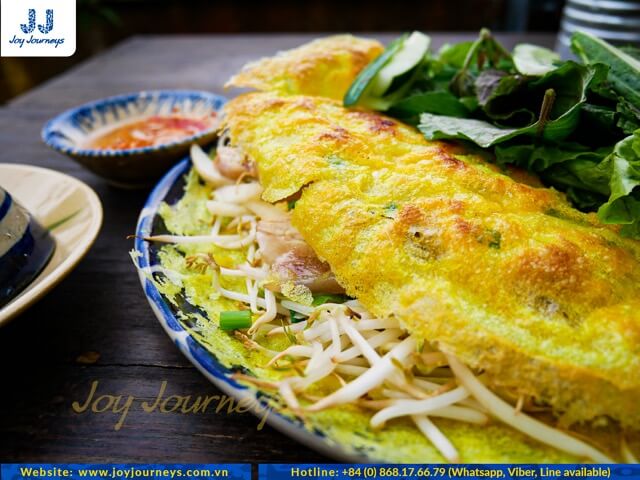
Vegetable Soups (From classic dishes to regional specialties, Vietnamese cuisine is a unique and flavorful experience. You can explore the flavors of authentic Vietnamese cuisine at the country’s bustling food markets, where the sensory experience alone is worth the visit.
Prices are also incredibly affordable, so you can usually find a complete meal for a few dollars. You can also find street food vendors selling their specialties at the markets, and this is a great way to get an authentic taste of the local cuisine.
Explore Vietnamese bread for a taste of Vietnam’s culinary delights.
Street Food in Vietnam
The street food scene in Vietnam is an essential part of the culture, and it’s an experience you will want to experience. From traditional favorites like pho and banh mi to more exotic dishes like bun bo hue and banh xeo, you can find a wide variety of delicious options.
Whether you’re looking for a quick snack or a full meal, Vietnamese street food is sure to satisfy your taste buds. And with prices ranging from just a few cents for snacks to a few dollars for a meal, it’s easy to enjoy all the flavors of Vietnam without breaking the bank.
Rice Paper Salad (Banh Trang Tron)
Rice Paper Salad, or Banh Trang Tron, is a distinctive street food in Vietnam, showcasing a blend of textures and flavors. It typically comprises thinly sliced rice paper, green mango, herbs, quail eggs, dried shrimp, peanuts, and a tangy dressing. This combination results in a harmonious mix of crunchy, savory, and slightly tangy elements, making it a popular and refreshing snack for travelers exploring Vietnam’s street food scene.
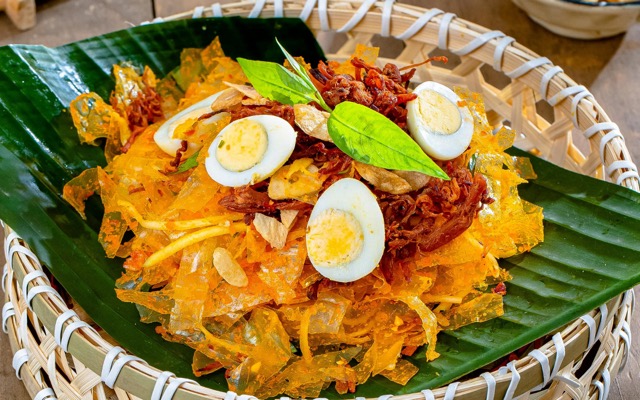
Vietnamese Pizza (Banh Trang Nuong)
Known as “Vietnamese pizza,” Banh Trang Nuong is a unique street food item. It involves grilling a rice paper base over an open flame and topping it with ingredients such as minced pork, shrimp, green onions, quail eggs, and a drizzle of chili sauce. This creates a crispy, flavorful snack that’s commonly enjoyed among locals and tourists in Vietnam.
Sweet Soup (Che)
For those with a sweet tooth, Vietnam offers a variety of sweet soups collectively known as Che. These desserts are made using ingredients like mung beans, tapioca pearls, coconut milk, and seasonal fruits. Che is served in a range of temperatures, either hot or cold, making it a popular and colorful choice for those seeking sweet treats in the Vietnamese street food scene.
Stir-Fried Corn (Bap Xao)
Bap Xao is a straightforward yet satisfying street food dish that involves stir-frying young corn kernels with garlic, scallions, and occasionally dried shrimp. The result is a delectable combination of sweet and savory flavors, making it a convenient on-the-go snack for travelers.
Vietnamese Popiah (Bo Bia)
Vietnamese Popiah, or Bo Bia, is a twist on the traditional fresh spring roll. It features a rice paper wrap filled with julienned jicama, Chinese sausage, dried shrimp, herbs, and occasionally slices of egg. Accompanied by a sweet and savory peanut dipping sauce, it offers a blend of textures and flavors for those interested in trying a unique street food.
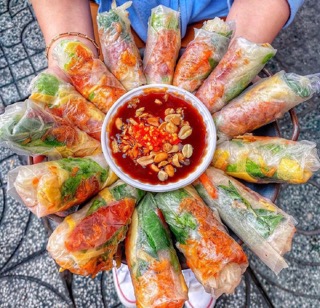
Fried Rice Flour Cake with Eggs (Bot Chien)
Bot Chien is a distinctive street food dish featuring small, crispy fried rice flour cakes served with eggs and a soy-based sauce, sometimes sweetened. The interplay of crispy and soft textures, along with the savory-sweet flavors of the sauce, make it a memorable and comforting choice for those exploring the diverse world of Vietnamese street food.
Duck Balut (Trứng Vịt Lộn)
Duck Balut, known as “Trứng Vịt Lộn” in Vietnamese, is a unique and somewhat adventurous street food choice. Balut is a fertilized duck egg, where the embryo is allowed to develop before being boiled and served. It’s a popular delicacy among locals and can be found at street food stalls in Vietnam. The egg contains both the yolk and the partially developed duck embryo, offering a mix of textures and flavors that are both intriguing and distinct. It’s a must-try for those seeking to experience a truly authentic part of Vietnamese cuisine.
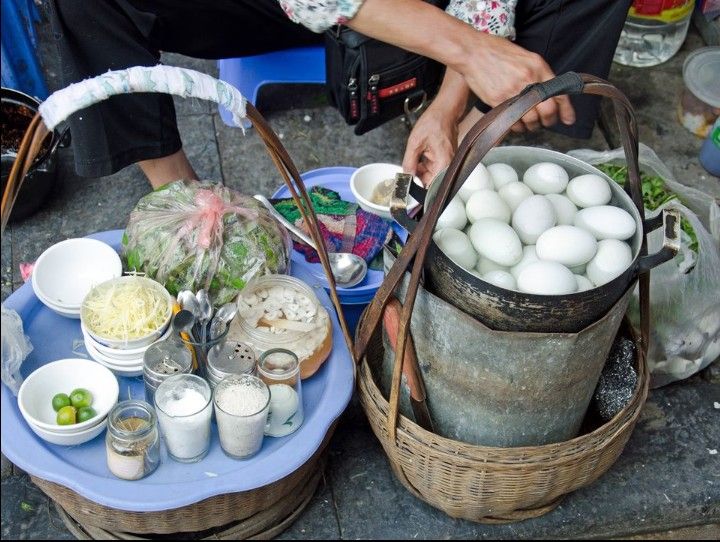
Exploring Vietnam’s street food is an adventure for your senses, offering a tantalizing mix of flavors, aromas, and textures. While indulging in these culinary delights, remember to embrace the local dining culture by sitting on those tiny plastic stools, sipping on sweet Vietnamese coffee, and immersing yourself in the lively atmosphere. The diversity and authenticity of Vietnam’s street food scene make it a memorable part of your culinary journey through this beautiful country.
Embark on a journey through the irresistible taste of Vietnam, exploring its diverse culinary offerings
Experiencing Vietnamese Breakfast
Vietnamese Porridge
Vietnamese Porridge, known as “Chao,” is a comforting and nourishing dish that’s perfect for travelers seeking a warm and hearty breakfast option. It’s often made by simmering rice or corn in a flavorful broth until it reaches a silky, creamy consistency. You can find various versions of Chao, including ones with chicken (Chao Ga) or with fish (Chao Ca), each offering its unique taste. Topped with fresh herbs, fried shallots, and a drizzle of soy sauce, this dish provides a soothing start to your day and a glimpse into Vietnamese breakfast traditions.

Vietnam Omelette
Vietnamese Omelettes, or “Trứng Chiên,” are a popular breakfast item found at street food stalls throughout the country. They are typically made with eggs and can be customized with a variety of ingredients like minced pork, shrimp, onions, and sometimes bean sprouts. This quick and flavorful breakfast dish is often served with a side of fish sauce or chili for an extra kick of flavor.
Vietnamese Udon
While not as commonly associated with Vietnamese cuisine as pho, Vietnamese Udon, or “Bánh Canh,” is a delightful noodle dish that should not be missed. These thick, chewy udon noodles are often served in a rich and savory broth, along with ingredients like shrimp, crab, or pork. Bánh Canh is a testament to the diversity of Vietnamese noodle soups, offering a different texture and flavor profile that’s equally satisfying.

Dry Noodles in Vietnam
Vietnamese Dry Noodles, or “Mì Khô,” are a popular street food choice that offers a contrast to the traditional noodle soups. These noodles are served without a broth and are typically tossed with a variety of ingredients, such as grilled meats, fresh herbs, peanuts, and a flavorful sauce. Mì Khô is a convenient and delicious option, providing a unique way to enjoy Vietnamese noodles.
Vietnamese Bun Noodles
Bun Noodles are thin rice vermicelli noodles that are a common base for a variety of Vietnamese dishes. They are often served in bowls with fresh herbs, vegetables, grilled meats, and a dipping sauce. Bun Thit Nuong, which combines grilled pork with these noodles, is a particularly popular choice, but there are many other Bun Noodle variations to explore, each offering a symphony of flavors and textures.

Vietnam Fried Noodles
Vietnamese Fried Noodles, or “Mì Xào Giòn,” are a delightful and filling street food option. These noodles are stir-fried with a medley of ingredients, such as vegetables, seafood, and your choice of protein, creating a delicious blend of flavors. The dish is often seasoned with soy sauce or oyster sauce, and it’s a perfect choice for travelers looking for a satisfying and savory meal on the go.
Xôi (Sticky Rice)
Xôi is a Vietnamese sticky rice dish that’s often prepared with a variety of toppings, such as mung beans, fried shallots, or steamed chicken. It’s a filling and convenient street food choice, offering a balance of flavors and textures, making it a great option for a quick and satisfying snack during your travels in Vietnam.
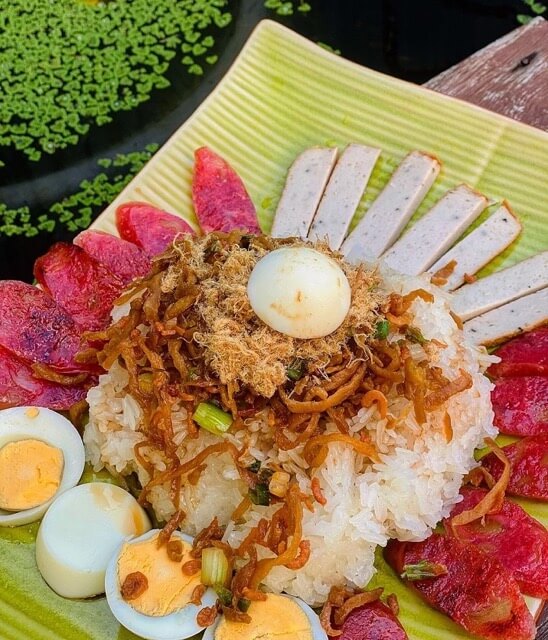
Bánh xèo (Cripsy Vietnam Pancake)
In the north, you can find savory pancakes with shrimp and pork and steamed buns filled with mushrooms and pork. Meanwhile, in the south, dishes like bánh xèo, a type of crepe made with rice flour and filled with shrimp, pork, and bean sprouts, are popular breakfast options.
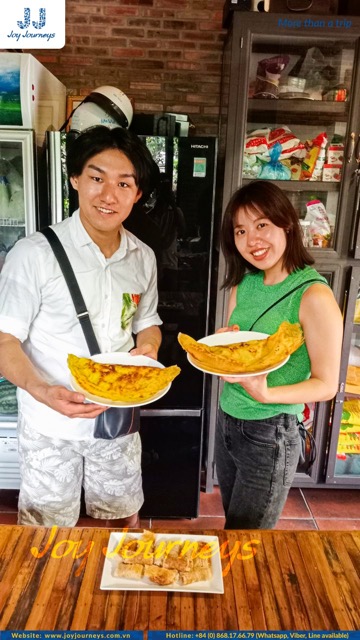
No matter which region you visit, you can find delicious breakfast options that are sure to please. Vietnamese breakfast offers a range of unique and flavorful options worth exploring.
Whether you prefer a quick bite from a street vendor or a sit-down meal at a local eatery, there are many delicious dishes to choose from. The lively atmosphere of morning food markets is a must-see, with vendors selling everything from fresh fruit to piping-hot bowls of noodle soup.
Indulge in the finest Vietnamese candy, savoring the sweet memories that encapsulate the flavors of Vietnam.
Celebrating Vietnamese Festivals through Food
Vietnam New Year Food
Vietnam is a country with a rich culinary culture, and the significance of food during the country’s biggest holiday, Tết, is no exception.
During this festive season, traditional dishes are enjoyed by families and friends as a way to commemorate the holiday. The most popular dishes served during Tết are Bánh Chưng and Bánh Tét.

Both of these dishes are said to symbolize the wish for a prosperous and lucky year ahead. Bánh Chưng is a savory rice cake made with glutinous rice, mung beans, and pork, often served with pickled vegetables. Bánh Tét is a sweet rice cake made with glutinous rice, mung beans, and pork, usually served with a sweet coconut sauce.
Other popular dishes served during Tết include Bún Mắm, a type of noodle soup, and Nem Rán, a type of fried spring roll. These dishes are usually enjoyed with family and friends and are said to bring good luck and fortune for the upcoming year.
To further explore the importance of food during Tet, it’s worth noting that it’s not just a simple meal but rather a representation of familial love, unity, and tradition.
The Tet meal is more meticulously prepared and attended to than the other meal of the year. Traditional dishes showcase the diversity of Vietnamese cuisine and represent a unique part of Vietnamese culture.
Additionally, these dishes are passed down from generation to generation and are an essential part of the cultural values that are taught and preserved for future generations.
Therefore, experiencing Vietnamese festivals through food is a unique way to immerse yourself in the country’s culture and traditions.
Double Fifth Festival (Tet Doan Ngo)
Tet Doan Ngo, also known as the Double Fifth Festival, is a significant celebration in Vietnam that typically falls on the fifth day of the fifth lunar month. This festival marks the arrival of summer and serves as a time for Vietnamese families to enjoy zongzi, a traditional sticky rice dumpling wrapped in bamboo leaves. These delectable dumplings are filled with a variety of ingredients, such as mung beans, fatty pork, and aromatic spices, creating a savory and slightly sweet treat. You can find zongzi at street vendors, markets, and family gatherings during this festive time.
Full-Moon Festival (Tet Trung Thu)
The Full-Moon Festival, known as Tet Trung Thu in Vietnamese, is a delightful celebration held on the fifteenth day of the eighth lunar month. This festival is primarily centered around the appreciation of family bonds, and one of the most beloved traditions is sharing mooncakes. Mooncakes come in a range of flavors, such as lotus seed, green bean, and durian, and they are beautifully crafted with intricate designs. During Tet Trung Thu, the streets come alive with colorful lanterns, parades, and the joyous sound of children singing and dancing. Travelers are encouraged to join in the festivities, savor mooncakes, and experience the warmth and togetherness that this festival represents.

Other Food Festivals in Vietnam
Vietnam is a country that celebrates its diverse cuisine with a wide range of food festivals and events, such as the Hue Festival, Hoi An Lantern Festival, and Southern Fruit Festival. These festivals offer visitors the opportunity to explore the unique flavors of Vietnamese cuisine and gain insight into the culture through a variety of activities.
The Hue Festival, held every two years in the city of Hue, showcases a wide variety of traditional dishes and celebrates the city’s rich culinary heritage. Visitors can sample dishes such as banh beo and bun bo hue and experience the authentic flavors of Vietnamese cuisine.

Similarly, the Hoi An Lantern Festival, held annually in the city of Hoi An, celebrates the city’s culinary culture. Visitors can explore local eateries and sample signature dishes like cao lau and white rose. The festival also features traditional activities such as dragon boat racing and music performances.
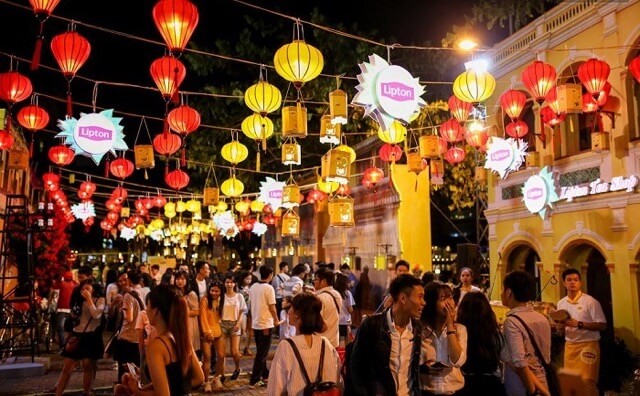
For those interested in exploring the unique fruits and flavors of the region, the Southern Fruit Festival held annually in Can Tho is a must-visit. Visitors can explore local markets and sample exotic fruits such as durian and mangosteen while participating in cooking competitions and fruit carving demonstrations.
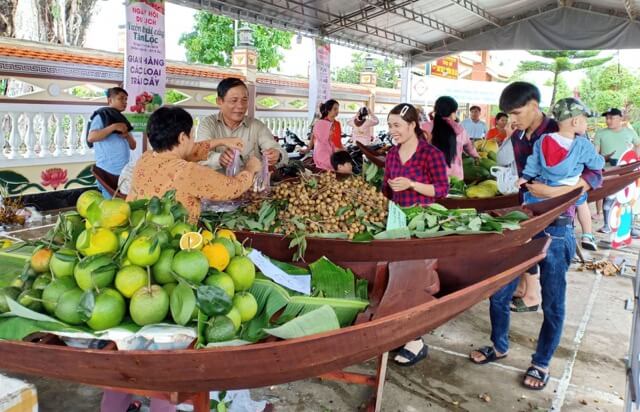
When planning a trip to Vietnam, it’s important to understand the food prices and budget-friendly dining options available. Fortunately, plenty of delicious, authentic Vietnamese dishes won’t break the bank.
Many restaurants serve meals for as little as $1-2 USD, and street food vendors often offer even cheaper options. By haggling with vendors at food markets, visitors can negotiate prices for items like fresh seafood, fruits, and vegetables and get the most out of their culinary experience.
Immersing in Vietnam’s Food
Healthy Food in Vietnam
Vietnamese cuisine is often celebrated for its balance and use of fresh, wholesome ingredients. It’s a cuisine that effortlessly blends flavors, textures, and nutrition, making it an ideal choice for health-conscious travelers. Here are some key elements of healthy food in Vietnam:
- Fresh Vegetables and Herbs: Vietnamese dishes are generously adorned with an array of fresh vegetables and herbs, such as mint, basil, and cilantro. These not only enhance the taste but also provide vital nutrients.
- Light Noodle Dishes: Noodle-based dishes like “Pho” and “Bun” offer a comforting yet light option. These dishes often include lean meats and a variety of fresh herbs.
- Vegetarian and Vegan Options: Vietnam offers a plethora of delicious vegetarian and vegan choices. Explore “Com Chay” (vegetarian rice dishes) and dishes prepared with tofu and fresh vegetables.
- Balanced Flavors: Vietnamese cuisine is known for its harmonious combination of sweet, salty, sour, and spicy flavors. The balance of these tastes ensures a satisfying meal that is also health-conscious
Vietnam Food Market
Vietnam Food Markets: Where Freshness Takes Center Stage
Vietnamese food markets are a true spectacle of the senses. They not only provide access to the freshest ingredients but also serve as a window into the daily life and culture of the country. Here’s what you can expect from Vietnam’s bustling food markets:
- Fresh Ingredients: Markets are a treasure trove of fresh fruits, vegetables, and herbs. You’ll find heaps of lemongrass, kaffir lime leaves, and Thai basil, perfect for recreating the flavors of Vietnam in your own kitchen.
- Street Food Stalls: These markets are not just for purchasing ingredients; they’re also hubs for street food vendors. Savor dishes like “Bun Thit Nuong” (grilled pork with vermicelli) and “Com tam” (broken rice), all prepared fresh and right before your eyes.
- Exotic Delights: For the adventurous traveler, some markets offer more unusual or exotic ingredients, including a range of fresh seafood and meats. It’s a chance to explore local delicacies.
- Local Specialties: Each region in Vietnam has its culinary specialties. Food markets are the ideal place to try regional dishes that may not be as readily available in restaurants. Be sure to ask vendors for recommendations.
- Cooking Insights: Visiting markets allows you to observe how ingredients are sourced and learn more about the local cuisine. It’s an educational experience for those interested in Vietnamese cooking.
- Social and Cultural Experience: Food markets provide insights into the culture and way of life in Vietnam. Engage with locals, taste authentic dishes, and absorb the vibrant atmosphere of these lively marketplaces.
Conclusion
Vietnam is a country with a rich and diverse culinary culture. From the traditional dishes of the north to the specialties of the south, there is something for everyone to enjoy. Whether you’re looking for an adventure in Vietnamese flavors or a unique dining experience, Vietnam has something to offer.
With its vibrant markets, local eateries, and festive celebrations, Vietnam is sure to provide a gastronomic journey that will leave you with unforgettable memories. So, why plan your trip to Vietnam today and experience the flavors of authentic Vietnamese cuisine?
Frequently Asked Questions
Q1: Is Vietnamese food healthy?
A1: Yes, Vietnamese food is generally healthy and nutritious. It is low in fat and calories and high in fiber, vitamins, and minerals. Vietnamese cuisine is also characterized by using fresh ingredients, such as vegetables, herbs, and spices, which provide various health benefits.
Q2: How much does food cost in Vietnam?
A2: The cost of food in Vietnam varies depending on where you go and what you order. Street food is the cheapest option, with meals costing around $1-3 USD. Mid-range restaurants offer dishes from $3-7 USD, while a meal in a high-end restaurant can cost up to $20.
Q3: What is the best food in Vietnam?
A3: There is no single best food in Vietnam, as the cuisine is incredibly varied and diverse. Popular dishes include Pho (noodle soup), Bun Cha (grilled pork with noodles), and Banh Mi (Vietnamese sandwich).
Q4: What is the main food in Vietnam?
A4: Rice is the main staple food in Vietnam, with most meals served with a side of steamed white rice. Other common ingredients include noodles, fresh vegetables, herbs, and spices.


Related Posts
Saigon’s “Flower Market Replica”: Where To Find Them
Ho Chi Minh City’s floral charm is not limited to its bustling wholesale markets. Imagine wandering through a place where vibrant petals, fragrant blooms, and the spirit of traditional Vietnamese markets come alive—without the overwhelming crowds. A flower market replica captures that magic, blending the beauty of fresh flowers with the charm of a curated, […]
Is it Safe to Travel to Vietnam Right Now? A Complete 2025 Guide
Vietnam has emerged as one of Southeast Asia’s most captivating destinations, drawing millions of visitors annually with its rich culture, stunning landscapes, and incredible cuisine. However, many travelers still ask: Is it safe to travel to Vietnam right now? This comprehensive guide provides you with everything you need to know about Vietnam travel safety in […]
Ho Chi Minh Cu Chi Tunnels Tour: The Ultimate Guide
The Cu Chi Tunnels stand as one of Vietnam’s most remarkable historical sites, offering visitors a profound glimpse into the ingenuity and resilience displayed during the Vietnam War. For travelers, a Ho Chi Minh Cu Chi tunnels tour represents an essential experience that combines education, adventure, and deep cultural understanding. This comprehensive guide will help […]